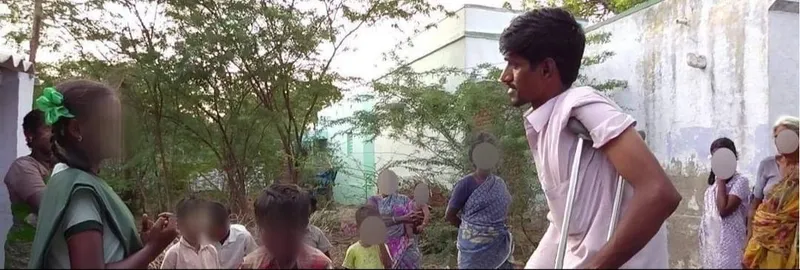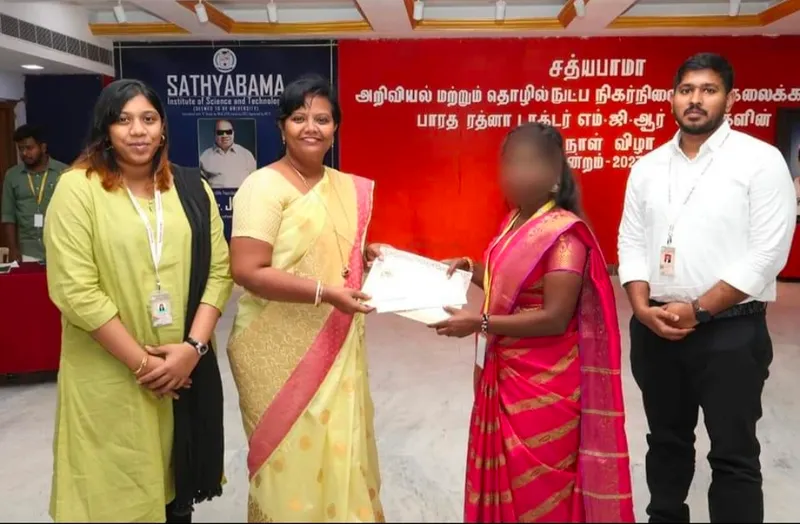Breaking the cycle of crime with restorative justice and education
KR Raja, an advocate and a disability rights activist, is the de facto guardian to almost 1,000 children of convicts he has worked with. Raja has so far counselled more than 2,500 prison inmates, including undertrials and convicted prisoners serving time across Tamil Nadu since 2012.
(Trigger warning: This story talks about domestic crime, murder, and suicide.)
In 2022, sessions courts in India handed 165 death sentences—the highest number in a year since the beginning of this millennium, according to the 'Death Penalty in India: Annual Statistics 2022’ report released by Project 39A, an advocacy group with the National Law University, Delhi.
Even as retributive punishment takes centre stage in public discourse, one man from Madurai, Tamil Nadu, has made restorative justice his life’s mission.
KR Raja, an advocate and a disability rights activist, is the de facto guardian to almost 1,000 children of convicts . He has so far counselled more than 2,500 prison inmates, including undertrials and convicted prisoners serving time across the state.
His mission has been to improve the quality of life of inmates through his organisation Global Network for Equality, established in 2012, and in turn, reshape the destiny of their children with education.
Raja has lived with post-polio residual paralysis, a condition that has affected both his lower limbs, since he was three months old.
“All my life, I’ve pushed beyond all imaginable limits to become fully independent. But what I saw in prison were men plagued by such deep mental trauma that, in most cases, was born out of generational, systemic disparity, and oppression. And I began to wonder if these people would ever get that chance to course correct their lives,” says Raja.
The first time he interacted with prisoners was as a 24-year-old social work student in Puducherry in 2009, for a thesis he was doing on ‘psychopathic deviation and adjustment patterns of prisoners’. What started then has evolved into his life’s work at Madurai and Palayamkottai central prisons where he visits for months on end, building rapport with inmates and finding ways to help their families.
Raja has earned five degrees—the highest in his family. His training as a psychiatric counsellor, criminologist, medical social worker, and lawyer has enabled him to identify the intersectionality of poverty, mental health, and crime, helping him understand the dynamics that bring them together and find long-term sustainable solutions in criminal justice and crime prevention.
“A large number of cases I have worked with involve men killing their wives while inebriated, when small fights and bickering escalate into fatal crimes. I’ve seen some men even admit to the crime—owing to their history of family discord and circumstantial evidence—but having no memory of it,” says Raja.
“Alcohol addiction is high among men in poor homes because it is easily and cheaply available and makes them forget the mental stress of debt, unemployment, and lack of resources that they battle on a day-to-day basis,” he says.
Employing systematic desensitisation therapy—a method that helps patients overcome phobias and post-traumatic stress disorders with relaxation techniques and gradual exposure to fears—Raja has helped inmates complete their school and college education while serving time, reconnected them to their families, and increased the chances of remission of their sentences and their employability once they come out.
Victims of generational trauma
At the very top of Raja’s focus group are children who have lost their mothers to domestic crimes by their fathers. The fathers, in these cases, are usually incarcerated.
“Overnight, their lives are upended and they are orphaned,” says Raja.
“Many of them are young children who have been witnesses to the crime or were the first ones to find the bodies of their mothers. When we find them, these children are in a state of shock, fall sick frequently, and become completely recluse, as there is no mental health intervention reaching them at this crucial time,” he adds.
It is only much later when Raja and his team have established ample trust with the families that mental health support can be given.

Through his work, Raja has supported at least 1,000 children of convicted prisoners from low socioeconomic backgrounds across Tamil Nadu to finish school and college.
Among the first things to take a hit in these scenarios is education.
There are several reasons why children drop out of school; the extended families that take them in may want them to start working. The children themselves are, at times, scarred for life, lose friends due to the stigma surrounding the crime in their family, or get severely bullied in school and within their communities.
“Unfortunately, it is always children coming from abject poverty who cannot afford justice that end up entering the justice system,” says Kalpana Purushothaman, member of the Juvenile Justice Board, Bengaluru (urban) and a professor at the Indian Institute of Psychology. “It is never those who have the social and economic prowess to afford justice that enter the system,” she says.
Purushothaman also observes that more than 90% of the boys who come in conflict with the law are raised by single parents—mostly mothers.
“When fathers abandon the family or die, young boys are forced to grow up early, become the man of the house and take up responsibility. This journey invariably brings them into contact with grown-ups who initiate them into ‘adult’ habits such as smoking, drinking, drugs and sex, which they are too immature to process and understand. These circumstances catalyse them to come in conflict with the law,” says Purushothaman.
“But what completely changes the trajectory of their lives is education,” she adds.
Global Network for Equality uses a news monitoring tool to collate incidents of crimes from print and digital media on a daily basis. They secure the source of the story and get to the police stations in those jurisdictions, from where they are directed to the location of the incident. In almost every case, the children have relocated to homes of maternal grandparents, uncles, or paternal aunts. And sometimes, tracking them down can take months.
A recent case in point is that of Maha* (12) and Deepa*(13), who hail from a remote village in Kanyakumari. Late last year, their stepfather killed their mother and hanged himself. The girls were the sole eyewitnesses to both the deaths.
“Because the stepfather died by suicide, the police had closed the case and we couldn’t find the address of the children. We stayed in Kanyakumari for two days and travelled extensively, tracking down acquaintances and neighbours, before we finally found the girls near Kottar, a village in Nagercoil, with their maternal grandmother,” says Raja.
Among the things that the NGO does is get these children their due from the Tamil Nadu Victim Compensation Scheme for Women Victims/Survivors of Sexual Assault/Other Crimes 2018 scheme. It also helps them in opening long-term FDs in their names and getting scholarships for college. Their work so far has been supported consistently by individual donors, says Raja.
Reclaiming what’s lost through education
“Getting me to continue school and finish college is just the conspicuous impact of Raja sir’s work with me,” says 24-year-old Mayil* of Tirunelveli, who works as a quality analyst in a medical equipment company in Bengaluru.
Mayil’s mother worked as a beedi roller and his father was among nine men accused of killing a man at a temple festival in Tirunelveli in 1994.
“But behind this victory is a whole decade of dogged encouragement and dialogue by him (Raja) that kept me from falling between the cracks, which can easily happen when you are the son of a man who is convicted of murder,” says Mayil.

Raja's Global Network for Equality has partnered with Sathyabama University to offer full scholarships to children of convicts rescued by the NGO
When he first met Raja in 2014, Mayil was just 14.
“I so badly wanted to study higher, but I had no idea how I was going to do it,” he says.
“Raja sir helped me enroll into B.Tech in biomedical engineering at Sathyabama College after having several conversations with me about what I wanted to do in life. I call this part of my life a miracle, because up until then, I never thought I could consciously choose something for myself,” says Mayil.
Mayil was also the first beneficiary of Global Network for Equality's partnership with Sathyabama University under which 10 seats are allocated to children rescued by the NGO every year. The scholarship scheme also gives them access to free education and hostel accommodation.
In the works is ‘Crime Free India Mission,’ a centre in Madurai that Raja envisions as a research and development and outreach programme for crime prevention and conflict resolution.
“We want to take our programmes to high-crime districts, along with our team of reformed convicts and police officials, who can talk to the community about their life experiences,” says Raja.
“And since children have always been at the heart of our work, this centre will also actively be involved in working towards reducing and eliminating the collateral damage caused to families of convicts after a crime.”
*Names have been changed to protect identities.
(For any mental health emergency, call the national mental health helpline: 1800-599-0019. )
Edited by Affirunisa Kankudti






